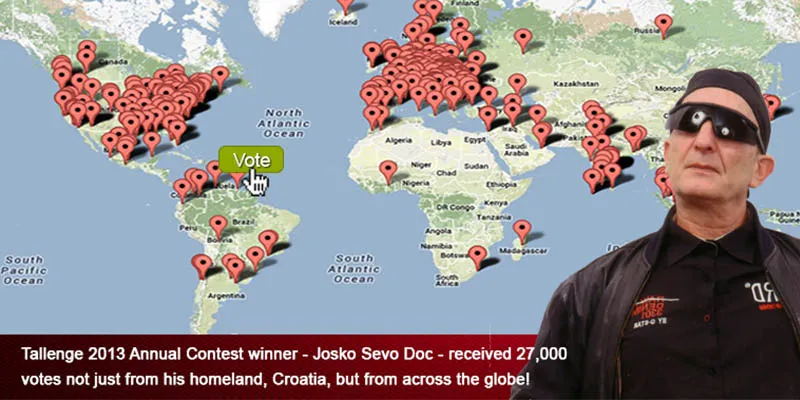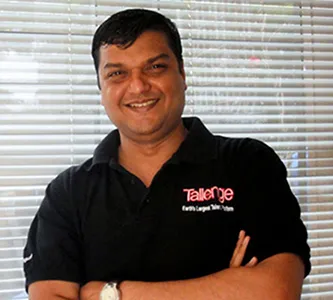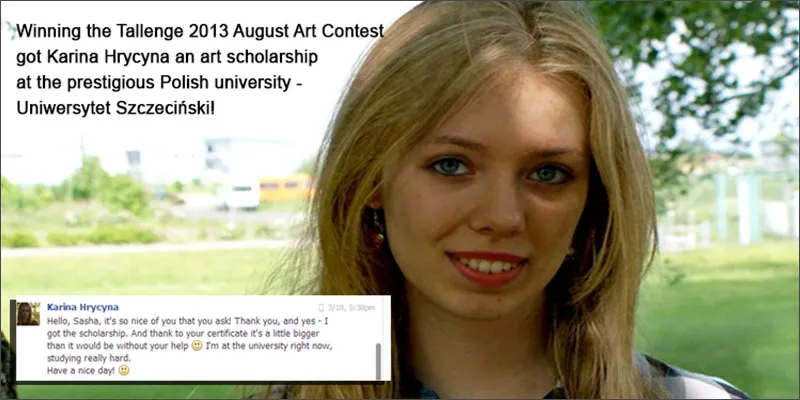Got a talent? Tallenge could make you rich and famous
Entrepreneurs are expected to fight fires, take on challenges and beat Goliaths. But how often do you hear of an entrepreneur who was forced to tackle a vicious smear campaign the day after he launched his startup? And persevere to get over 1,000,000 footfalls from 150 countries in less than a year, turning it into a global talent promotion platform with a strong enough foundation to attract a top notch investor like Kalaari Capital? Such is the story of Praveen Gupta and his venture, Tallenge.
Already, Tallenge has scripted several rags to riches tales across the globe. For example, Josko Sevo from Croatia, who used to play music in cafes and restaurants, when he wasn't working as a construction labourer or seafarer, was catapulted into fame when he won the Tallenge 2013 year-end music contest; he found countless fans and bagged $10,000 in prize money.

Evolutionary step beyond online content
At the outset, Tallenge can seem like just another video uploading platform. What is the need for one more when there are several sites like YouTube, Flickr, Vimeo, DeviantArt, Reverbnation and so on -- online repositories of different kinds of content -- one might ask.
The answer is straightforward. While most of these sites monetise the content, they give little scope for the artist who uploaded it in the first place. The success of Psy or Justin Bieber is an anomaly. What chance does it offer a local artist in an obscure town to get on the global stage, grow a fan-base worldwide and find opportunities to make money? That's where Tallenge comes in.
Praveen envisioned it as "the evolutionary step beyond YouTube, Flickr and such formats". He believed "people who upload content online should be able to get more out of it than mere showcasing."
On the Tallenge website, there are several contests for every type of talent, from singing and dancing to creative writing, filmmaking, photography, painting, comedy and even cooking, which you can join any time and start winning votes - from visitors to the website as well as your social network. Upload your work and promote the entry through Facebook, Twitter, Google Plus, Pinterest, Tumblr, LinkedIn and YouTube. And since it is on the Internet, there are no physical constraints of geography.
The participant with the highest number of votes wins. Sounds simple enough, doesn't it? Quite like the popular TV shows American Idol or Got Talent taken online. Well, yes and no. At its core, the concept is similar to the hotly contested television shows, but there's a lot more to it.
It empowers both artists as well as audiences online. While it gives an unknown artist a fair chance to become a global star, internet users who have been consuming online content passively are empowered to discover and create the next big star. "The audience who can see and vote on original, competition-quality, curated content get to sit in the judge's chair," Praveen says.

Since its beta launch in mid 2013, Tallenge has seen participants from over 150 countries. "With its worldwide audience, Tallenge is the Earth's largest talent platform," Praveen says with pride.
The market size is huge. "Of 3 billion internet users, 7 - 10% create content online. There are over 200 million active content contributors," Praveen points out.
The lure of glamour and fame
The Tallenge idea struck Praveen a few years ago. He was running Cross-Tab, a market research company he founded in 2000. They would often hire mathematics or statistics graduates fresh out of college.
One day in 2011, two of Praveen's new recruits walked up to him and asked for a three-month break. "I was surprised. Who would want to take such a long break so soon into a good job? They told me that they were going for the Indian Idol audition, and explained how important it was for them," Praveen recalls.
That these bright youngsters were willing to sacrifice a professional opportunity for a shot at showcasing their creative talent got Praveen thinking. It showed him how irresistible the lure of glamour and fame is for youth. But opportunities to get a platform were limited. "There are just a few good music contests, one good dance show, one hot cookery competition and so on. On top of it, to win a chance to participate you have to wait a year or more, stand in a queue for hours. Maybe then you can make it. But what if your boss refuses to sanction leave for the audition day? Or you get a sore throat and cannot sing that day?"
There, Praveen spotted the pain-point and the opportunity. The available platforms had too many constraints. "The slots for the programme on TV are limited. So there are only so many people or teams who can participate." Praveen decided to work on providing an alternative.

To simplify a complex idea
With Cross-Tab, Praveen had enough experience as an entrepreneur. He was also an active angel investor and mentor with other startups. So he had sufficient exposure in the online business space to figure out how best to create the talent platform he had in mind.
Initially, the idea was to take the whole format of singing and dancing contests online. That would solve a lot of physical constraints right away. But that wasn't enough, he felt. "Why should it just be performing arts, and not all kinds of talent? Why should it be limited to one country, why can't participants from all parts of the globe contest at once? Why restrict it to a certain age or skill level?" All these questions popped up, and more and more layers were added to the core idea.
With so many aspects, the product became complex. "All formats had to be brought into one platform. Not just performing arts but visual arts, literature, blogging, filmmaking, photography, cooking and so on. It had to be a level-playing field for anybody in the world. A guy in China should be able to compete with someone in the US, Brazil or Poland."
The challenge then was to tackle the complications so well in the backend that the eventual users would only find a simple platform that they could easily access.
"What works in the US might not work in China or Romania or India. What works for a young, tech-savvy guy in Vietnam might not work for a semi-literate but extremely talented person in another corner. You might be 15 or 85, but you have to find the site comfortable to navigate and easy to participate," Praveen says.
He had to find the lowest common denominator on multiple fronts that way. "We put everything into the melting pot and extracted the purest - simplest - form out of it."
Making it a viable business was the next challenge.
The battle with mud-slingers
Back to the story of how this entrepreneur was forced to fight an inferno right in the beginning.
From conceptualisation to product design, it took Praveen almost two years of hard work to get everything together and launch the product. "Almost immediately, a vicious smear campaign began online. There were all kinds of accusations against Tallenge, saying that we would misuse the uploaded content, wouldn't give any prizes and it was a scam." Overnight, there were posts about Tallenge grabbing copyrights of the uploaded content and so on.
The attack was so sudden and unexpected that Praveen was taken aback. "If you check the agreement with the participants, you will see no tricky clause. We don't own the content uploaded, the ownership and rights remain with the participant. Take for instance, the photography contest run by National Geographic. They will ask for the raw file from the participant only as proof of its authenticity. That's the same for any online contest. For content that we ourselves cannot verify whether it is original, participants have to submit proof," Praveen explains.
Despite the mudslingers, Tallenge ran the contests, gave away prizes, and organically gained reputation as participants talked about it. "We didn't do any advertising," Praveen says. "Credibility is built over time and our intent is true. So we persisted."

Global talent platform
Initially, most of the participants were from Europe, mostly France, Germany and Poland. Slowly, North America caught up, and now they are seeing a lot of traction from South East Asia.
Thanks to his perseverance, over 100,000 pieces of work have been uploaded by over 50,000 participants on the Tallenge website so far and a million plus votes have been cast.
A couple of months ago, Kalaari Capital came on board. With their backing, the plan is to launch "a bigger and better Tallenge", Praveen promises. “We are working hard to create the most talent-centric platform in the world, where besides showcasing and participating in contests, talented folks will get tools to collaborate with others from around the globe, as well as engage with new audiences.”
With evident joy, Praveen recalls how Tallenge created winners from unexpected nooks. For example, Bryan Magsayo, a young musician from Valencia City, Philippines, won the 2014 quarterly contest, got featured on TV networks in his country, and became a local hero. Jeno Putiani-Holl a.k.a. Pempi, a comedian from Hungary, won two contests. He has been active on YouTube since 2007, is part of the YouTube Partner Program and has over 25,000 subscribers for his channel. However, “I get paid very little for the monetized views from YouTube, so I am truly thankful to Tallenge for honouring my work, thus encouraging me to continue my art," he says. Amateur filmmaker from Australia, Matt Whittington, who won a monthly film contest on Tallenge, says: “Initially, I thought I had no chance, but it wouldn't hurt trying. Then suddenly, I had a fighting chance and I won. It just goes to show that everyone has a chance at winning. I'm lucky enough to have had someone suggest Tallenge to me.” He adds that the win was extra special as “I've never won a thing in my life, especially not something for my work.”
The long and short of the story is that Tallenge has leveled the playing field for talented people to get visibility, grow their fan base globally, compete and win. For all you know, you might discover the next Psy or Michael Jackson on Tallenge! Stay tuned!
What do you make of a talent contest online? Let us know in the comments section below.







